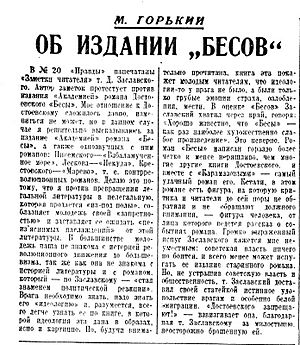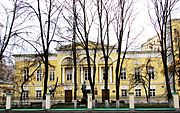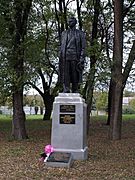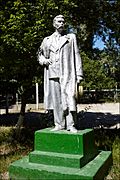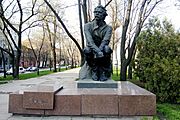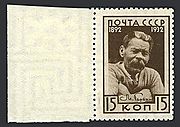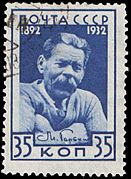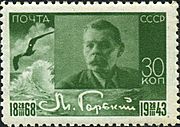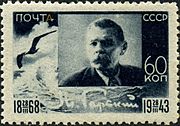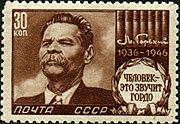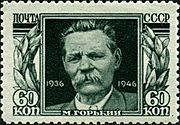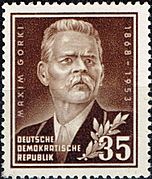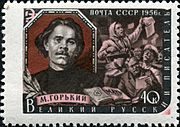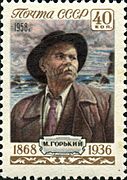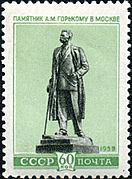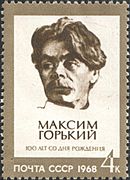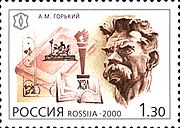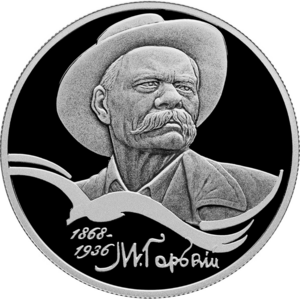Maxim Gorky facts for kids
Quick facts for kids
Maxim Gorky
|
|
|---|---|
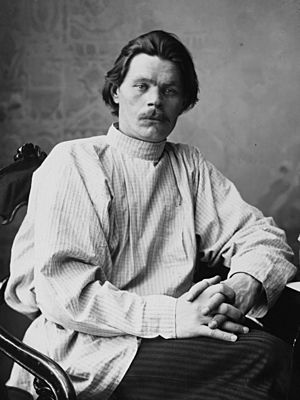
Gorky in 1900
|
|
| Born | Aleksey Maksimovich Peshkov 28 March [O.S. 16 March] 1868 Nizhny Novgorod, Nizhny Novgorod Governorate, Russian Empire |
| Died | 18 June 1936 (aged 68) Gorki-10, Moscow Oblast, Soviet Union |
| Occupation | Prose writer, dramatist, essayist, politician, poet |
| Period | 1892–1936 |
| Notable works | The Lower Depths (1902) Mother (1906) My Childhood. In the World. My Universities (1913–1923) The Life of Klim Samgin (1925–1936) |
| Signature | |
Alexei Maximovich Peshkov (Russian: Алексе́й Макси́мович Пешко́в; 28 March [O.S. 16 March] 1868 – 18 June 1936), known as Maxim Gorky (Russian: Макси́м Го́рький), was a famous Russian writer. He was also a political thinker who supported socialist ideas. He was nominated five times for the Nobel Prize in Literature. Before becoming a successful author, he traveled a lot across the Russian Empire. He worked many different jobs, and these experiences later helped him write his stories.
Gorky's most well-known works include his early short stories from the 1890s, like "Chelkash" and "Twenty-Six Men and a Girl". He also wrote plays such as The Lower Depths (1902) and Children of the Sun (1905). His autobiographical books, My Childhood, In the World, My Universities (1913–1923), tell the story of his own life. Another famous work is his novel Mother (1906). Some of his later works, like The Life of Klim Samgin (1925–1936), are considered his best. Gorky was friends with other famous Russian writers like Leo Tolstoy and Anton Chekhov.
Gorky was involved in the Marxist communist movement and later with the Bolsheviks. He spoke out against the Tsarist government. For a time, he worked closely with Vladimir Lenin. He lived outside of Russia and the Soviet Union for a big part of his life. In 1932, he returned to the USSR after Joseph Stalin invited him. He lived there until his death in 1936. After his return, he was called the "founder of Socialist Realism". This was a style of art and literature that promoted socialist ideas.
Contents
Maxim Gorky's Early Life and Writing Career
Growing Up and Traveling
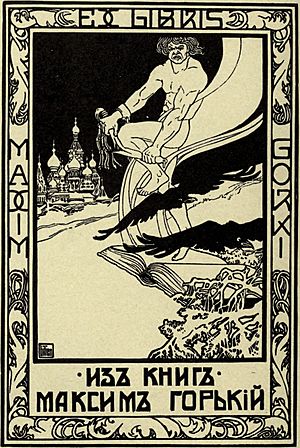
Alexei Maximovich Peshkov was born on 28 March [O.S. 16 March] 1868 in Nizhny Novgorod. He became an orphan when he was eleven years old. His grandmother raised him, but he ran away from home at age twelve in 1880. He then traveled across the Russian Empire for five years, mostly on foot. During this time, he worked many different jobs. These experiences gave him many ideas for his future writing.
He started writing for local newspapers as a journalist. He used the pen name "Jehudiel Khlamida." In 1892, he began using the name "Gorky," which means "bitter" in Russian. He chose this name because he felt angry about life in Russia. He wanted to tell the "bitter truth" in his stories. His first short story, "Makar Chudra," was published in 1892.
Gorky's first book, Essays and Stories, was a huge success in 1898. This marked the start of his writing career. He wrote constantly, believing that literature could change the world. He wrote about the lives of poor people and those on the edges of society. He showed their struggles and hardships. But he also highlighted their inner strength and humanity.
Developing Political and Literary Ideas
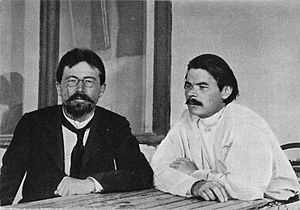
Gorky became very famous as a writer. People saw him as a unique voice from the lower classes. He strongly supported changes in Russia's society, politics, and culture. By 1899, he was openly connected with the growing Marxist movement. This made him popular among thinkers and workers.
At the heart of Gorky's work was his belief in the value of every human being. He wrote about people who were strong and full of energy. He compared them to those who gave up because of difficult life conditions. His writings show him as a "restless man" who struggled with faith and doubt. He loved life but was also disgusted by the meanness he saw in the world.
Gorky publicly opposed the Tsarist government and was arrested many times for his views. He became friends with many revolutionaries, including Vladimir Lenin, whom he met in 1902. In 1902, Gorky was chosen as an honorary Academician of Literature. However, Tsar Nicholas II canceled this honor. In protest, other famous writers like Anton Chekhov and Vladimir Korolenko left the Academy.
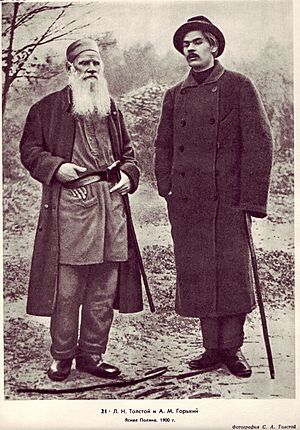
From 1900 to 1905, Gorky's writing became more hopeful. He became more involved in the movement against the government. He was briefly jailed again in 1901. In 1904, Gorky tried to start his own theater in Nizhny Novgorod. But the government censor banned all the plays he wanted to stage, so he gave up the project.
As a successful writer, Gorky used his money to support the Russian Social Democratic Labour Party. He also supported calls for civil rights and social reform. On January 9, 1905, government soldiers shot workers who were marching peacefully to the Tsar. This event, known as "Bloody Sunday", pushed Gorky towards more radical ideas. He became closely linked with Vladimir Lenin's Bolshevik group. While in prison during the 1905 Russian Revolution, Gorky wrote the play Children of the Sun. He was released after many famous people across Europe, like Marie Curie, spoke out for him.
After the revolution was put down, Gorky fled to Finland. In 1906, the Bolsheviks sent him to the United States to raise money. While there, Gorky wrote Mother, a novel about revolutionary struggle. His time in the United States made him dislike the "bourgeois soul," which he saw as focused on money and comfort.
Life in Exile and Return to Russia
Living in Capri
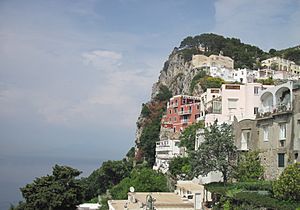
From 1906 to 1913, Gorky lived on the island of Capri in southern Italy. He moved there partly for his health and to escape the strict government in Russia. He continued to support the Russian social-democratic movement, especially the Bolsheviks.
In 1906, Maxim Gorky visited New York City at the invitation of Mark Twain and other writers. An invitation to the White House by President Theodore Roosevelt was taken back. This happened after a newspaper reported that the woman with Gorky was not his wife. After this, hotels in Manhattan refused to let them stay. They had to find an apartment in Staten Island.
Gorky met Lenin again during a visit to Switzerland. Gorky believed that "culture"—meaning people's moral and spiritual understanding—was more important for the revolution than political or economic plans.
Coming Back from Exile
Gorky was allowed to return to Russia in 1914. This was due to a special forgiveness for the 300th anniversary of the Romanov dynasty. He continued to criticize society and help other writers. He also wrote important memoirs, including the first part of his autobiography. When he returned, he felt that "everyone is so crushed and devoid of God's image." He believed "culture" was the only answer.
During World War I, Gorky's apartment in Petrograd became a Bolshevik meeting place. His political views remained close to the Bolsheviks during the revolutionary period of 1917. However, his relationship with the Bolsheviks became difficult after the October Revolution. Gorky wrote that Vladimir Lenin and Leon Trotsky were "poisoned with the filthy venom of power." He felt they were crushing individual rights to achieve their revolutionary goals. He compared Lenin to a chemist experimenting on the "living flesh of Russia."
Gorky's newspaper, Novaya Zhizn (New Life), was censored by the Bolsheviks during the civil war. Around this time, Gorky published essays criticizing the Bolsheviks called Untimely Thoughts in 1918. These essays called Lenin a tyrant for his arrests and stopping free speech. Gorky compared Lenin to both the Tsar and Nechayev.
In 1921, Gorky hired a secretary, Moura Budberg, who later became his partner. In August 1921, the poet Nikolay Gumilev was arrested. There is a story that Gorky tried to get him released, but Gumilev was executed before Gorky could help. In October, Gorky returned to Italy because he had tuberculosis.
Second Time in Exile
Gorky left Russia in September 1921 and went to Berlin. He heard about a trial in Moscow against 12 Socialist Revolutionaries. This made him even more against the Bolshevik government. Italy's government did not let him return to Capri. Instead, he settled in Sorrento, where he lived from 1922 to 1932. He lived with a large household, including his son and grandchildren.
He wrote several successful books while in Sorrento. But by 1928, he needed more money to support his family. He started to try and work with the communist government. Joseph Stalin, the leader of the Communist Party, also wanted Gorky to return to the USSR. Gorky visited Russia in May 1928. During this visit, he became friends with Genrikh Yagoda, a high-ranking officer in the secret police.
Returning to Russia for Good
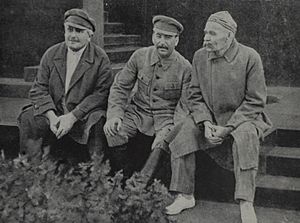
Gorky's return from Fascist Italy was a big win for Soviet propaganda. He received the Order of Lenin and was given a large house in Moscow and a country home. His hometown of Nizhni Novgorod was renamed Gorky. Moscow's main park and a central street were also renamed in his honor. The largest airplane in the world at the time, the Tupolev ANT-20, was named Maxim Gorky.
He was also made President of the Union of Soviet Writers, which was created in 1932. On October 11, 1931, Gorky read his fairy tale poem "A Girl and Death" to Joseph Stalin and other leaders. Stalin wrote on the poem, "This piece is stronger than Goethe's Faust (love defeats death)."
Later Life and Challenges
In 1933, Gorky helped edit a book about the White Sea-Baltic Canal. This book presented the canal as a success story for "rehabilitating" former enemies of the government. Gorky also helped political prisoners, sometimes with the help of his ex-wife, Yekaterina Peshkova. For example, he helped change Mikhail Bakhtin's prison sentence to exile.
Gorky followed the career of writer Bulgakov. He admired Bulgakov's talent. Partly because of Gorky, Bulgakov's plays The Cabal of Hypocrites and The Days of the Turbins were allowed to be performed. Gorky also tried to help stage Bulgakov's play Flight, but Stalin personally banned it.
Gorky's relationship with the Soviet government became more difficult after his return in 1933. He was not allowed to leave for Italy again. He continued to write articles praising Stalin in the newspaper Pravda. However, by 1934, he was growing more distant from the government. He disagreed with how the new Writers Union was run. This conflict grew, possibly made worse by the early death of his son, Max.
His meetings with Stalin became less frequent. He was influenced by other figures like Lev Kamenev and Nikolai Bukharin. Gorky tried to fight Soviet censorship as it became stronger. For example, he tried to defend an issue of Dostoevsky's Demons. As these conflicts became more public, Gorky's influence weakened. Some sources say that because he refused to blindly follow Stalin's policies, he lost the Party's favor. He spent his last days under unofficial house arrest.
Gorky's Death
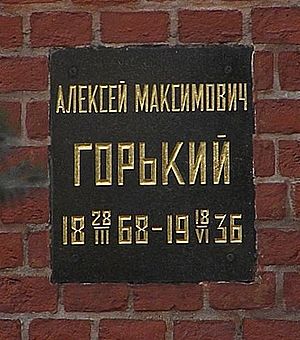
As Stalinist control increased, Gorky was placed under unofficial house arrest at his home near Moscow. His long-time secretary, Pyotr Kryuchkov, was secretly working for the police. Before Gorky died from a long illness in June 1936, Stalin, Yagoda, and other top communists visited him.
Gorky's son, Maxim Peshkov, died suddenly in May 1934. Gorky himself died in June 1936 from pneumonia. There has been much talk about the circumstances of his death. Stalin and Molotov were among those who carried Gorky's ashes at his funeral. During a trial in 1938, one of the charges was that Gorky was killed by Yagoda's secret police agents.
In Soviet times, Gorky was seen as a great Soviet writer who came from the common people. He was portrayed as a loyal friend of the Bolsheviks and the founder of "socialist realism." This was a simplified view of his complex life and ideas.
Remembering Maxim Gorky
Places and Institutions Named After Gorky
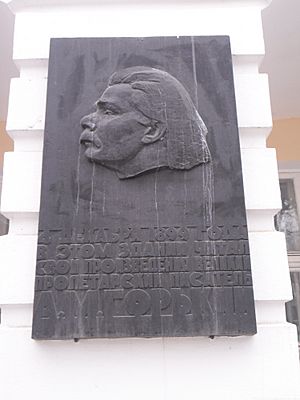
- Many streets, avenues, and lanes in former USSR states are named "Gorky." In 2013, over 2,100 streets in Russia had his name.
- Nizhny Novgorod was called Gorky from 1932 to 1990.
- Several villages and railway lines are named after him.
- In Nizhny Novgorod, the Central District Children's Library, the Academic Drama Theater, a street, and a square are named after Maxim Gorky. His museum-apartment is also there.
- Many drama theaters in cities like Moscow, Vladivostok, Berlin, Minsk, and Rostov-on-Don are named after Maxim Gorky.
- Palaces of Culture named after Maxim Gorky were built in cities like Nevinnomyssk and Saint Petersburg.
- Several universities, including the Maxim Gorky Literature Institute, were named after him.
- Parks in cities like Rostov-on-Don, Moscow, and Kharkiv bear his name.
Statues and Monuments
Monuments to Maxim Gorky are found in many cities. Some of these include:
- In Russia: Moscow, Nizhny Novgorod, St. Petersburg, and many others.
- In Belarus: Dobrush, Minsk.
- In Ukraine: Donetsk, Kharkiv, Yalta.
- In Azerbaijan: Baku.
- In Kazakhstan: Alma-Ata.
- In Georgia: Tbilisi.
- In Moldova: Chisinaus.
- In Italy: Sorrento.
- In India: Gorky Sadan, Kolkata.
On December 6, 2022, the City Council of Dnipro, Ukraine, decided to remove all monuments to Russian cultural and historical figures from the city. This included monuments to Gorky. The Gorky monument in Dnipro, built in 1977, was taken down on December 26, 2022.
- Monuments of Gorky
Stamps and Coins
Maxim Gorky has been featured on postage stamps from many countries, including Albania, Vietnam, and India.
- Maxim Gorky postage stamps
-
Postage stamp, GDR, 1953
In 2018, the Russian Post released a special sheet of stamps for his 150th birthday.
In 1988, a 1 ruble coin was issued in the USSR to celebrate his 120th birthday. In 2018, the Bank of Russia issued a silver coin for his 150th birthday.
Works Inspired by Gorky
- In 1912, the Italian composer Giacomo Orefice created an opera called Radda. It was based on a character from Gorky's 1892 short story Makar Chudra.
- In 1932, German playwright Bertolt Brecht wrote the play The Mother. This play was based on Gorky's 1906 novel Mother. The same novel was also turned into an opera in 1938.
- From 1938 to 1939, Gorky's three-part autobiography was made into three movies. These were The Childhood of Maxim Gorky, My Apprenticeship, and My Universities. All three were directed by Mark Donskoy.
- In 1975, Gorky's 1908 play The Last Ones had its first New York performance. It was called Our Father and directed by Keith Fowler.
- In 1985, Gorky's 1906 play Enemies was translated and performed in London.
See also
 In Spanish: Máximo Gorki para niños
In Spanish: Máximo Gorki para niños
 | Roy Wilkins |
 | John Lewis |
 | Linda Carol Brown |


